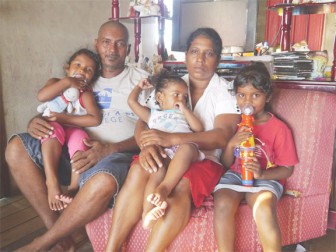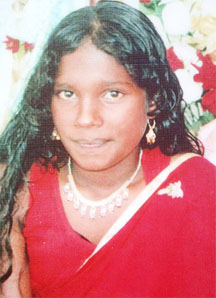The recent rape and murder of a Woodley Park, West Coast Berbice girl has reopened old wounds for a family that experienced a similar tragedy almost four years earlier.
Rajesh Panday, 42, and Claudette David, 39, were devastated when the young man who was tried for the 2008 rape and murder of their daughter, 12-year-old Kavita “Vinesha” Panday of Block ‘D’ Bath Settlement, West Coast Berbice, was freed by the court.
Their grief and anger are still fresh, especially now given the recent rape and murder of Basmattie “Manda” Moonsammy of Woodley Park, two villages away, who died in a similar manner to their daughter.
David told Stabroek News that they have “left everything in the hands of God” because they are poor and don’t have the money to pursue the case.
As the news spread in the village on Saturday, August 4, the day Moonsammy’s body was found, persons started visiting Panday and David to console them.
“Everything came back fresh to me… Next month would be four years since this happen to my daughter and it’s like yesterday something happened,” she said.

What was more upsetting, she said, was that the bodies of both girls were found in similar positions.
Moonsammy’s badly decomposed body was discovered face down in a rice field. The body was partly buried and only the midsection was visible.
A few young men were taken into custody in connection with the crime. However, they were released after the 72-hour maximum holding period without charge had elapsed. Police were unable to lay charges because the post-mortem examination found that the cause of Moonsammy’s death was inconclusive.
Sources told this newspaper that they were still seeking advice in the matter as well as the help of an overseas expert. There is also a possibility that an exhumation may be required.
“Just how me feel fuh me daughter, just so the other girl’s parents feel,” David said, while adding that her daughter did not deserve such a cruel death.
With tears streaming down her cheeks throughout the interview, she recalled the last time she saw her daughter.
David had left home with her nine-month-old daughter, Avintika around 1 pm to visit a sick friend two houses away. Her son, Vinesh, 15, was also not at home. There were just a few houses in the area at the time and David watched as her daughter was riding along the street on a bicycle she had borrowed from a neighbour.
A 16-year-old boy, whose parents also had a farm, was riding next to her. Although she did not get a chance to ask her daughter where she was going, she looked over in her cash crop farm along the embankment by the seaside and saw cows damaging her crops. As a result, she assumed that the boy must have called her daughter to chase the cows.

David was returning home around 1.40 pm when the neighbour told her he wanted the bicycle her daughter had borrowed. She went upstairs to look for her daughter but did not find her. But it was only when she was standing at the doorway and noticed the neighbour’s bicycle on the street and the cows still in her farm that she suspected something was amiss.
David then asked the neighbour to keep the baby and she went in search of her daughter. She met the boy heading out of the street on his bicycle. His shirt was on the wrong side and he was trembling. The woman asked him where her daughter was and he responded that he did not know. She said she became angry and snapped a response. “How you nah know? Boy, don’t take your eyes and pass me! You do me daughter something!” she recalled saying, to which he gave a denial and then he offered a ride on his bicycle to go to find the girl.
David said she went with him because she wanted to reach quickly, but she recalled the bicycle “shaking so much like if he nervy, nervy” and she jumped off. “…Me start fuh run and me reach before he… but like he was planning fuh do me something now,” she recalled, adding that she started to holler for her daughter but there was no answer. She paused and was standing at the corner of the trench, when the boy grabbed a long stick that was resting nearby. She turned around just in time to see him raising the stick over her.
She said she asked him “bai wah you going and do wid da stick? Wah you do me daughter? He said ‘nothing aunty’ and he tek it [stick] and throw it back.”
David added that she could no longer take the suspense. “…Me bow ah he foot and say, ‘Me know you rape she. Me nah go tell she daddy. Me nah go mek nobody know. Just tell me weh me pickney deh….’”
Without denying the allegation, she said, he told her to check by the hole in the seine that was hanging close to her farm]. She retorted, “boy me tell yuh me want me pickney and yuh telling me ‘bout hole?”
He then said “come leh me show you this thing” and led her to the hole, which was big enough for her to pass through. She noticed a pair of green slippers her daughter had bought for her [mother’s] birthday along with her blue cap next to each other.
She immediately knew that something was dreadfully wrong and she started to scream at the top of her voice. Her screams attracted the attention of residents, who ran out to investigate.
It was her husband who made the gruesome discovery. Panday, who was at work when he got the news, found his daughter’s body face-down at the corner of the canal with only the back visible. The girl’s top was pulled up and her tights and underwear were pulled down to her knees. He assisted in retrieving the body after the police arrived.
Panday witnessed the post-mortem examination, which revealed that she died as a result of asphyxia due to drowning and multiple injuries. It was also confirmed that she was raped.
The father also said there was mud on her tongue, “shrimp grass” in her nostrils and weed in her stomach. Her lips were also burst while her body bore black and blue marks, suggesting she was beaten.
Since the tragedy, David has had two other daughters; Nerissa, 2 and one-year-old Eshika. But she said the grief for Kavita “would never go away until I die” and she prays daily that she would get justice.





